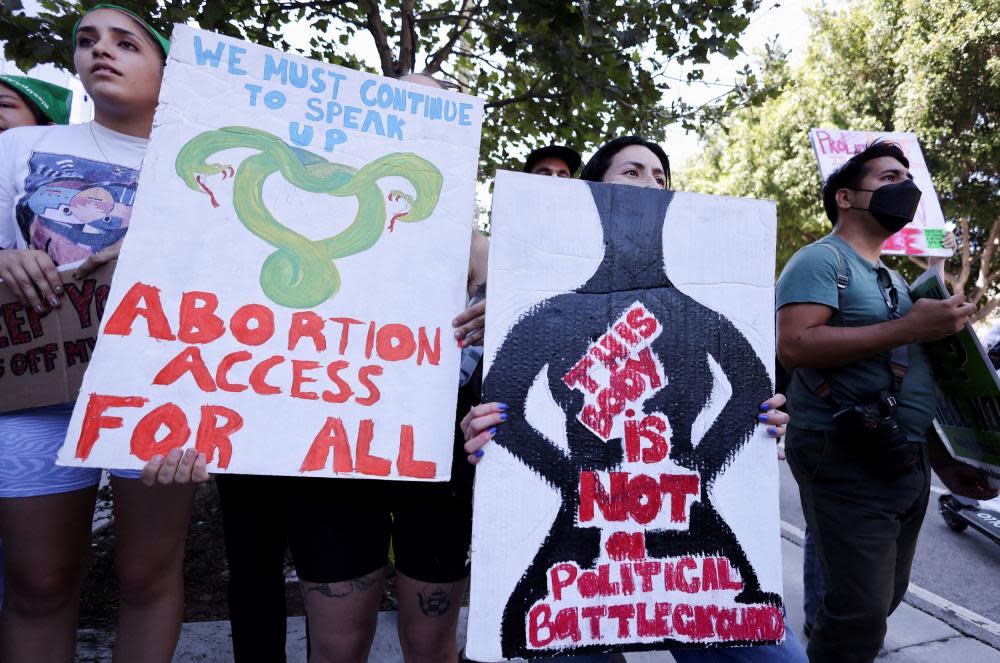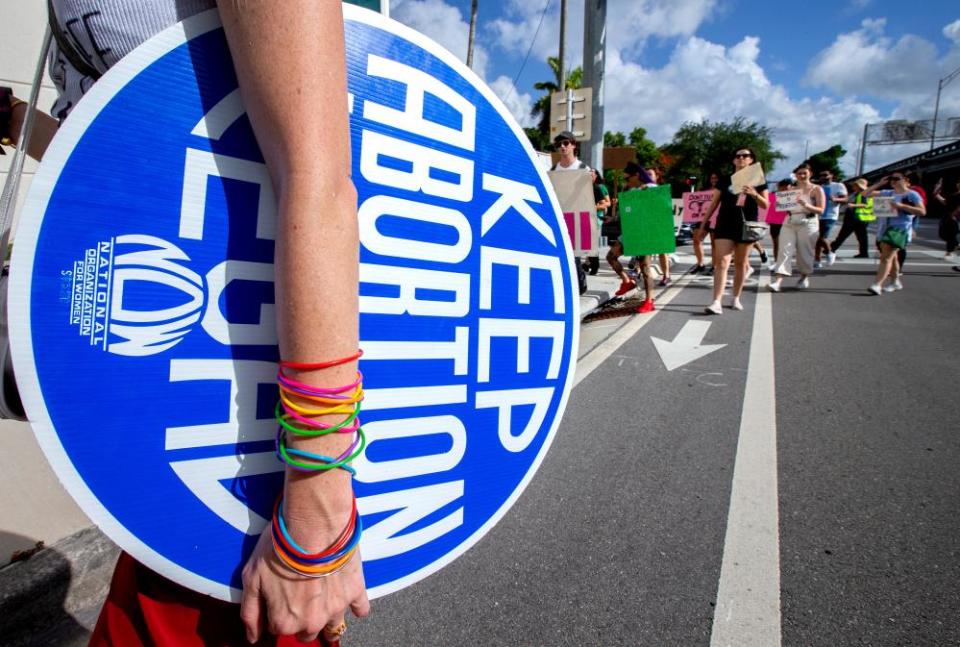What’s the difference between miscarriage and abortion? For some women, it’s hard to tell

Zoé Champion was 19 when she had an abortion. She was 26 when she realized it was an abortion.
Champion, who was sitting her high school exams in France at the time, had developed a pregnancy outside the uterus, threatening to rupture her fallopian tubes – a condition medically known as an ectopic pregnancy. The doctors intervened immediately, ending the pregnancy and saving her life.
But similarly to cookbook author and model Chrissy Teigen, who this week spoke out about miscategorizing her own abortion as a miscarriage, Champion didn’t realize she’d had an abortion until long after.
Related: Indiana judge blocks enforcement of abortion ban passed by Republicans
“It wasn’t an abortion for me [at the time]. I think because my health was at stake, there was no decision to be made,” says Champion, now 31 and living in New York.
Teigen told an audience at a social impact summit that she was pregnant with her third child with her husband, the singer John Legend, when she learned her pregnancy would not be viable – and that she would not survive without medical intervention.
“[It was] an abortion to save my life for a baby that had absolutely no chance. And to be honest, I never, ever put that together until, actually, a few months ago,” Teigen said.
She had very publicly discussed her pregnancy loss as a miscarriage at the time. It was only after the right to an abortion, long established by the supreme court in Roe v Wade, was overturned this summer that she realized she’d had the procedure: when she told Legend that she empathized with people who have an abortion, he pointed out she was one.
Although it is common for many people to think of miscarriage and abortion as entirely separate matters, doctors say that medically the distinction isn’t so clear. Many doctors consider an abortion as any termination of pregnancy, whether through spontaneous miscarriage or a voluntary action like taking pills to induce one. The line between voluntary and involuntary also shifts and blurs: a patient might start spontaneously bleeding during a wanted pregnancy, then require an intervention; a different patient might want to end their pregnancy only to be told to wait because early signs suggest it will be unsuccessful anyway (around a quarter of pregnancies end spontaneously).
The gray area between miscarriage and abortion is newly worrying now that more than a dozen states criminalize abortion. Patients could find themselves facing legal repercussions or traveling hundreds of miles to seek miscarriage care, for fear of it being mislabeled as an abortion. Dr Joan Fleischman, a New York-based doctor, sees a lot of overlap between abortion and miscarriage – in both cases “it’s not the right time” for a pregnancy to continue, be it for chromosomal or environmental reasons. She recently performed an abortion for a patient carrying triplets. The pregnancies, each implanted through in vitro fertilization, had stopped developing at different stages: one at six weeks, one at seven and one at eight.
Related: ‘I can’t stay silent’: Roe reversal powers new generation to sign up and vote
“None of them were going to be successful, so I removed that tissue for her,” she says.
During in vitro fertilization, Fleischman notes, people commonly fertilize more eggs than needed, to increase the chances of a successful pregnancy. Those excess eggs are commonly frozen, disposed of or donated for scientific research (which means destroying them), but none of that is thought of as abortion. What’s more, Fleischman’s patient wanted her pregnancy to be successful – she had invested tens of thousands of dollars in it – but still, the pregnancy ended in someone making a decision that the cells had to be removed: an abortion.
Calling something a miscarriage rather than an abortion can be helpful for patients who want to avoid stigma, Fleischman says. “Often, they don’t want their doctor to know, they don’t want their husband to know,” she says.
“If somebody wants their privacy, [the term] ‘miscarriage’ offers a way to talk about a loss. You know, without dealing with the stigma that people just dish on you, no matter who you are, no matter what your situation,” she says.
The danger is not just stigma: after people who miscarry, they often need an abortion procedure to protect their health, and many people miscarry after admitting a pregnancy was unwanted, leaving them open to skepticism – and possible investigation.
In some states, like Texas, abortion-inducing pills have been forbidden, although the same pills are commonly prescribed for miscarriage.

One of Fleischman’s patients traveled from Florida to New York for miscarriage care because of Florida’s 15-week abortion ban. Although the state law makes an exception in some cases “to remove a dead fetus”, some providers are wary of providing care that might be interpreted as violating the ban – and some patients feel uncomfortable about the scrutiny they endure regarding their pregnancy.
Following Teigen’s comments, many anti-abortion advocates argued that abortion and miscarriage cannot be equated. The anti-abortion media platform LifeNews tweeted: “There is a distinct difference between losing a child to ectopic pregnancy or miscarriage and brutality and intentionally ending a life through abortion.”
“In a miscarriage a mother who wants a child loses it through medical complications outside her control. In an abortion a mother willfully enlists an abortionist to scald, dismember and kill her unborn child. See the difference?” the right-wing commentator Dinesh D’Souza said.
These sentiments reflect the changing language around abortion, says Dr Leah Torres, an obstetrician-gynecologist in Alabama. Reproductive healthcare has been subject to public redefinition for centuries, she notes, pointing to laws used to criminalize birth control in the 19th century or, more recently, to posit the existence of ‘fetal heartbeats’ or redefine ‘personhood’.
“When someone calls me and says ‘I’m aborting,’ the image I have is of someone voluntarily inducing their own abortion,” says Torres. “But it’s perfectly scientific to say they started aborting in the bathroom, right? Meaning their pregnancy was unsuccessful and it was ending – exiting their body.”
Torres, whose license was temporarily suspended after she went to Alabama to practice following that state’s abortion ban (her license has since been restored, though she remains $115,000 in debt due to the case), argues these terms matter.
“In the desire to politicize pregnancy termination, [anti-abortion advocates] have removed abortion from being a healthcare issue. They have used the word ‘abortion’ to mean one thing: you got pregnant, now you want to kill your baby. So there’s no room for the actual medical nuance,” she says.
Fleischman says so many of her patients are shocked when they see the mucus-like tissue that is extracted during early pregnancy in an abortion, because it doesn’t look like the images they’ve seen of little fetuses curled up and forming a head, eyes and an abdomen – images commonly and incorrectly used to convey what pregnancy looks like prior to nine weeks.
“It’s just like this huge ‘aha!’ moment for women, like, ‘Oh my God, I’ve been duped. I’ve been on this emotional, judgmental, roller coaster, like this is murder, and this thing just looks like mucus?’” she says.
“This is a very intentional,” says Torres. “Because it’s essentially about taking abortion out of [the] healthcare bracket, and viewing it as an issue of intention, an issue of morality, not an issue of healthcare.”
People would find it ridiculous to say that Chrissy Teigen murdered her child, Torres notes, after a pregnancy she would have continued had it not become life-threatening. But Torres says that this differentiation – between the type of abortion Teigen had, or someone has after spontaneously bleeding on their bathroom floor, and an abortion someone has after walking into a clinic – is essential for anti-abortion activists to justify their rhetoric.
“The right needs to see what happened to her to seem different, because the right has equated abortion with murder,” she says.
Champion, who had her abortion at 19, wants that distinction to be done away with, and not just for herself.
“I want to contribute to depoliticizing this word ‘abortion’. To give it more meaning, so people see it as healthcare access,” she says. “The sooner we can all talk about it as healthcare, the better.”

 Yahoo News
Yahoo News 
